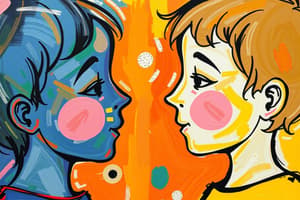Podcast
Questions and Answers
What is the primary role of language in early childhood education?
What is the primary role of language in early childhood education?
- To shape cognitive development and serve as a critical tool for categorizing and understanding the world (correct)
- To teach grammar and vocabulary
- To develop social skills
- To improve physical development
How can educators use language to enhance reasoning skills in preschoolers?
How can educators use language to enhance reasoning skills in preschoolers?
- By providing extra homework
- By using storytelling only
- By engaging children in activities and dialogues that stretch their ability to reason, analyze, and solve problems (correct)
- By watching educational videos
What is the purpose of discussing cause and effect in the classroom?
What is the purpose of discussing cause and effect in the classroom?
- To teach science
- To enhance physical development
- To develop critical thinking and problem-solving skills (correct)
- To improve reading skills
What is the benefit of using descriptive language to discuss similarities and differences?
What is the benefit of using descriptive language to discuss similarities and differences?
What is the purpose of arranging events in a logical order?
What is the purpose of arranging events in a logical order?
Why is one-to-one correspondence important in early childhood education?
Why is one-to-one correspondence important in early childhood education?
What is the purpose of discussing spatial relationships in the classroom?
What is the purpose of discussing spatial relationships in the classroom?
What is the role of language in fostering preschoolers' reasoning capabilities?
What is the role of language in fostering preschoolers' reasoning capabilities?
Why is language not just a subject to be taught?
Why is language not just a subject to be taught?
What is the outcome of integrating language-based activities into daily routines and playful learning?
What is the outcome of integrating language-based activities into daily routines and playful learning?
What is the primary outcome of educators guiding young children to develop advanced thinking skills through language?
What is the primary outcome of educators guiding young children to develop advanced thinking skills through language?
What is the primary benefit of using language to process and express thoughts on attributes and relationships?
What is the primary benefit of using language to process and express thoughts on attributes and relationships?
What is the primary purpose of sequencing activities in the classroom?
What is the primary purpose of sequencing activities in the classroom?
What is the primary outcome of using language to explain and infer cause and effect?
What is the primary outcome of using language to explain and infer cause and effect?
What is the primary benefit of classifying activities in the classroom?
What is the primary benefit of classifying activities in the classroom?
What is the primary purpose of using language to discuss spatial relationships in the classroom?
What is the primary purpose of using language to discuss spatial relationships in the classroom?
What is the primary outcome of using language to enhance preschoolers' reasoning skills?
What is the primary outcome of using language to enhance preschoolers' reasoning skills?
What is the primary benefit of using language to facilitate children's reflection on their learning?
What is the primary benefit of using language to facilitate children's reflection on their learning?
What is the primary outcome of engaging children in activities that stretch their ability to reason and analyze?
What is the primary outcome of engaging children in activities that stretch their ability to reason and analyze?
What is the primary role of language in early childhood education?
What is the primary role of language in early childhood education?
Flashcards are hidden until you start studying
Study Notes
Using Language to Develop Reasoning Skills in Preschoolers
- Language is essential in early childhood education as it shapes cognitive development and serves as a critical tool for categorizing, understanding, and interacting with the world.
- Strategic use of language can guide young children to develop advanced thinking skills that lay the foundation for later learning.
Developing Reasoning Skills through Language
- Discussing cause and effect helps children understand how and why things happen, enhancing their ability to predict and reason through everyday occurrences and academic challenges.
- Language enables children to breach concrete experiences and abstract concepts, enriching their understanding of complex ideas.
- Verbalizing thoughts helps children clarify their thinking, reflect on their learning, and articulate their understanding, which are crucial skills for academic success and personal growth.
Language-Based Activities to Enhance Reasoning Skills
- Comparing and contrasting objects or pictures using descriptive language to discuss similarities and differences helps children observe details and articulate their observations.
- Classifying objects based on specific characteristics involves using language to discuss categories and justify choices, enhancing vocabulary and learning words that describe attributes.
- Sequencing involves arranging events in a logical order, crucial for understanding time and processes, and can be achieved through storytelling or routine-based activities.
- One-to-one correspondence involves understanding that numbers correspond to specific quantities, which can be achieved through counting objects and matching number words to quantities.
- Discussing spatial relationships helps children understand prepositions and relational concepts, and can be achieved through activities such as instructions or questions about the position of objects in space.
- Understanding cause and effect helps children grasp why things happen and predict outcomes, which can be achieved through language-based activities such as storytelling or discussing the natural world.
Language and Reasoning Skills in Preschoolers
- Language is an essential component of early childhood education, shaping cognitive development and serving as a critical tool for categorizing, understanding, and interacting with the world.
- Educators can guide young children in developing advanced thinking skills by engaging them in activities and dialogues that stretch their ability to reason, analyze, and solve problems.
Using Language to Enhance Reasoning Skills
- Same and Different: Engaging children in activities that compare and contrast objects or pictures, using descriptive language to discuss similarities and differences, helps them observe details and articulate their observations.
- Classifying: Encouraging children to group objects based on specific characteristics involves using language to discuss categories and justify their choices, enhancing vocabulary and learning to describe attributes such as color, shape, and size.
- Sequencing: Arranging events in a logical order helps children understand time and processes, using storytelling or routine-based activities to construct and understand sequences.
- One-to-One Correspondence: Understanding that numbers correspond to specific quantities can be achieved by counting objects and matching number words to quantities.
- Spatial Relationships: Discussing the position of objects in space helps children understand prepositions and relational Concepts, using activities such as instructions or questions like "put the doll behind the chair" or "is the block under the table or on top of it".
- Cause and Effect: Understanding this concept helps children grasp why things happen and predict outcomes, using language to explain and infer cause and effect, such as in storytelling or when discussing the natural world.
Integrating Language-Based Activities
- Incorporating these language-based activities into daily routines and playful learning can enhance preschoolers' reasoning skills, supporting language development and fostering cognitive growth.
- These activities prepare children for more complex problem-solving and reasoning tasks as they progress in their education.
Studying That Suits You
Use AI to generate personalized quizzes and flashcards to suit your learning preferences.




